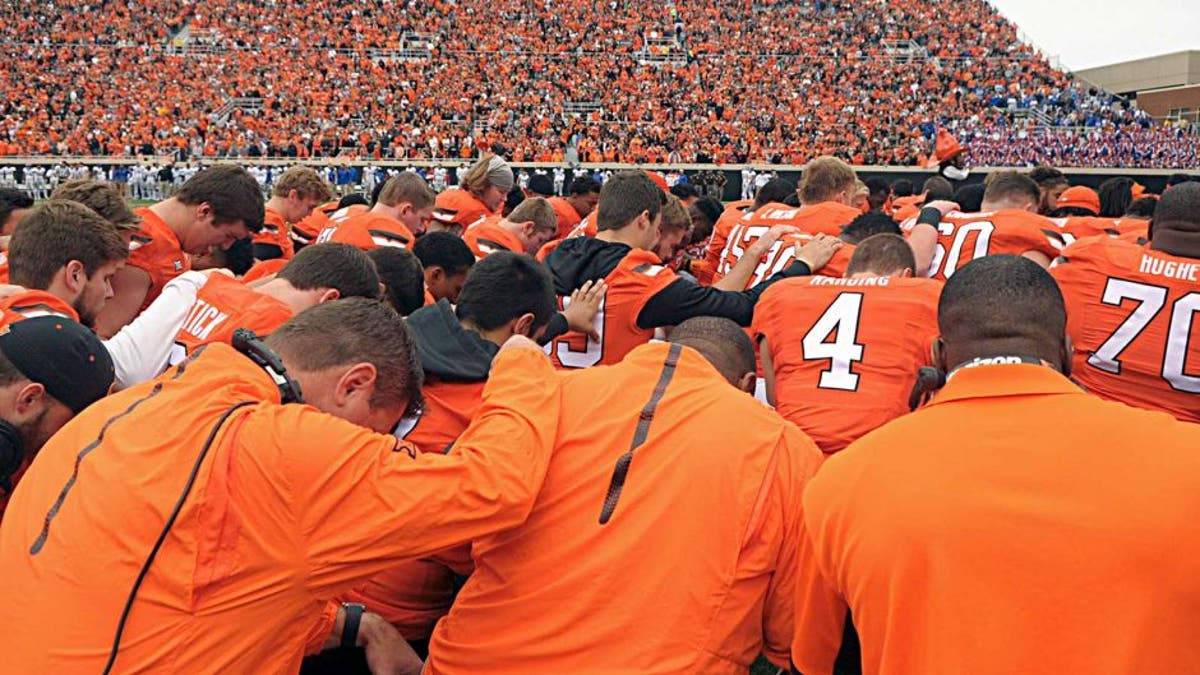
Oklahoma State players and staff form a prayer circle prior to an NCAA college football game between Kansas and Oklahoma St in Stillwater, Okla., Saturday, Oct. 24, 2015. Earlier in the day tragedy struck at the Oklahoma State homecoming parade as a car ran into a group of parade watchers killing at least three and injuring dozens more. (AP Photo/Brody Schmidt)
Americans are less religious than they were eight years ago, according the Pew Research Center’s 2014 U.S. Religious Landscape Study.
The study of 35,000 adults found that the religiously unaffiliated are, not surprisingly, becoming less religious in their beliefs and practices. Even so, about two-thirds of religiously-affiliated Americans still continue to pray daily, attend religious services once or twice a month, and describe religion as being very important to them. Not only that, evangelical Christians actually saw slight upticks in activities like weekly scripture reading, participation in Bible study groups, and evangelization.
You would think that with the cultural sea changes that have taken place in the last decade, societal pressures would have dampened the enthusiasm of traditional believers, who hold increasingly unpopular beliefs. But if the Pew study is right, that’s just not happening. Believers—particularly evangelical believers—are remaining steady, if not becoming more committed.
Evangelical Christians actually saw slight upticks in activities like weekly scripture reading, participation in Bible study groups, and evangelization.
We shouldn’t be surprised. It costs very little to join the majority of Americans who hold liberal views on things like the authority of scripture, abortion, and same-sex marriage. But for those who remain with the minority, there is a price to be paid for remaining faithful to beliefs that, in some cases, are cast as bigoted and prejudiced. The price may include being ostracized, bullied on social media, or even losing a job. And that kind of persecution, whether real or perceived, is more likely to galvanize, rather than discourage, members of a minority who are bound together by deeply-held religious beliefs.
In choosing to remain steadfast, religious conservatives have naturally become more close-knit with fellow believers. Not only that, they’ve become more willing to make alliances with people from other denominations (and in some cases, other faiths) who share their values.
Their solidarity might be a lost cause if it weren’t for the fact that, even if they are persecuted, they aren’t powerless. They still hold social capital through their purchasing power, the many political candidates who still stand with them, and the ways society remains dependent upon them for charity. Basically, the marginalization of Christians is turning into a powerful narrative about a team of formidable underdogs. And there's nothing like a hopeful underdog story to bring a group together.
So to those of you who would celebrate the news that there are growing numbers of irreligious Americans, you might want to hold off on doing a victory dance. Because all it’s doing is inspiring greater levels of commitment from the ranks of the most dedicated believers.
